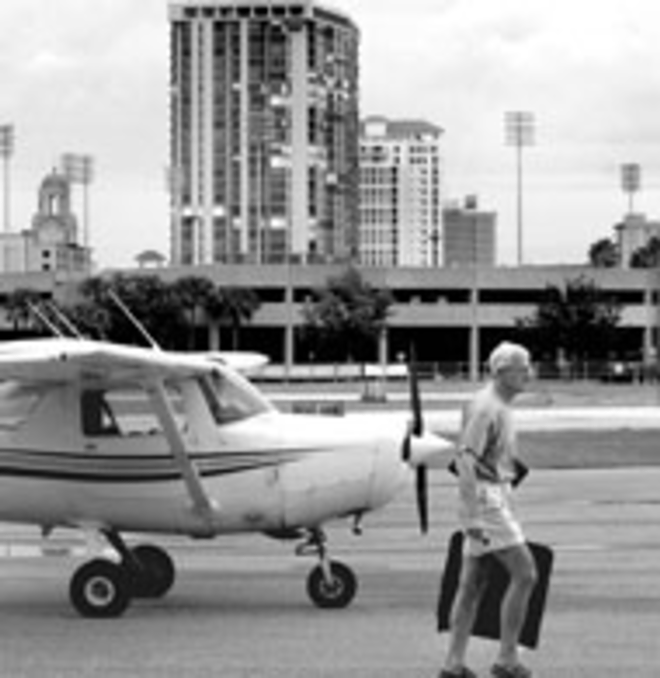
A healthy democracy depends upon a well-informed electorate. That is why, as the late, great Nelson Poynter often preached, the publishing of a newspaper is "a sacred trust." Voters can make wise decisions only if their news media take pains to cover all sides of a controversial issue.
So how well has Poynter's newspaper, the St. Petersburg Times, covered all sides of the Albert Whitted Airport debate?
Not very well.
A review of more than 100 news stories and editorials the Times has published about Albert Whitted since Jan. 1, 2002 reveals the newspaper's longstanding bias against the airport.
Here's one example:
Between April and September 2003 the Times published seven news stories about the petition drive to close the airport and turn half of it into a public park. Admiring in tone, the stories emphasized the underdog nature of the campaign, often focusing on the idealistic young people who were gathering the signatures. When the campaign seemed in danger of not reaching its goal by deadline, the Times gave it a boost with another story; the paper was even so helpful as to print the full wording of the petition — a service it rarely provides for proposals not yet on the ballot.
During the same period, the Times published just two stories about residents who want to see the airport appreciated for what it is: a unique asset in a city already blessed with abundant waterfront parks. And those stories, about the Albert Whitted Air Show early this month, took a critical tone. The headlines and lead paragraphs focused on airport opponents' concern that the event was an unfair promotion of the airport in violation of campaign finance laws.
Those concerns, while debatable, were probably worth raising. But the Times hasn't been nearly so aggressive at examining the motives of the park promoters — the participation of downtown real estate developers in the park campaign, for example, or the unanswered question of who will get to use whatever portion of airport property that isn't turned into a park.
On this last point, the Times was content until recently simply to accept the park promoters' reassurances that any private use of that land would have to pass through the voters in another referendum. What potential uses might someday be proposed weren't worth examining. (The paper corrected this oversight with a decent Oct. 19 story about development options.)
The Times is an exceedingly well-reported and well-edited newspaper. Individual news stories almost always are balanced with a nod to the other side because that's what good journalists know they must do.
The newspaper's bias mostly reveals itself in stories the paper doesn't report. Such as, what role might the airport play in downtown St. Petersburg's economy? Albert Whitted's supporters say the airport provides not only jobs but also an important amenity for the kind of city that St. Petersburg is becoming — a home for consultants and other knowledge-based business professionals whose work isn't bound by geography. By making it easier for busy creative types to commute, a convenient downtown airport makes the city a more attractive place to live and work.
As of last week, the city's dominant newspaper had not examined the economic value of the airport since last November, long before the voting public would be asked to determine its fate. Even then, the focus was primarily on who owns the planes that are based there. Who owns the planes is just a small part of who uses the airport and why, and what that traffic might contribute to the downtown business climate. (You might as well ask who owns the buses at the Greyhound station to discover who the riders are, where they are coming from, where they are going and what impact they have on the community.) Nevertheless, the narrower focus allowed the newspaper to create a dispute over whether hangar subleases and airplane ownership records ought to be public, thus reinforcing its underlying argument that airport users are a privileged few squatting on public property.
The Times has never told its readers that 100,000 flights come in and out of the airport every year, and that nearly half of those flights originate elsewhere. In other words, a substantial number of people use Albert Whitted as their preferred gateway to the city, where presumably they spend money or otherwise contribute to the city's vitality.
There's a good reason for the paper not to mention this traffic. It would undercut the Times' recurring characterization of the airport as merely a place where 177 rich people get to park their airplanes on the downtown waterfront.
Another glaring omission is the Times' failure to acknowledge in print that its owner, the Poynter Institute for Media Studies, is among the neighbors who wish their offices weren't so close to an airport. Several news stories have mentioned the airport's negative effects on the nearby University of South Florida, Bayfront Medical Center and All Children's Hospital — all worthy institutions, of course, deserving of public sympathy. The Poynter Institute is a worthy place too — hell, most of whatever I might know about good journalism, I learned through the Poynter Institute, as well as during my two dozen years at the Times — but apparently its proximity to the airport is not worth mentioning in either news stories or editorials.
Whatever alternative uses have been proposed for the airport, Times news stories have supported. Last year, the paper wrote several approving stories about proposals to build an attractive "urban village" — you know, like New York's Greenwich Village, only without the crime and garbage — on Albert Whitted land. Those plans were promoted first by the city's economic development director and later by architect/developer Tim Clemmons, who is now a leader in the waterfront park campaign.
At about the same time, the Times wrote one story about what a future airport might look like. Instead of a serious look at plans for a new terminal and such, the story focused on the most futuristic speculations. That allowed the first sentence to label it all as "science fiction."
This fall, the paper pretended to deconstruct the image of airport supporters as a bunch of rich hobbyists. But the attempt wasn't convincing, and the story never acknowledged the Times' own role in creating the stereotype.
The litany of selective reporting goes on, and that's not even counting the editorials.
By definition, editorials are allowed to be as biased as they can get away with, and no one has ever doubted the Times' official position on Albert Whitted. But the Albert Whitted editorials are full of misleading rhetorical tricks, like identifying the paper's own position with the public interest and dismissing all other positions as special interests. In the Times' view, its editorial board represents the true voice of the people, and the elected City Council members are merely dupes for the airport. Some editorials are so angry and shrill that they make our own John Sugg read like the McNeil-Lehrer Report.
The Times' reasoning is mighty selective. If, as the editorials assert, the airport benefits only a privileged few, then shouldn't we get rid of the downtown marinas, too, because only boat owners can use them?
And what about the Mahaffey Theater, whose renovation Andy Barnes and I championed in the mid-1980s, largely because the old Bayfront Theater was such a lousy and unattractive place to hear classical music? My mentor Andy and I share an elitist taste in music. So maybe we ought to turn the Mahaffey into green space too.
Times editorials harp on the taxpayer's subsidy of the airport ($325,000 this year) without mentioning that a subsidy three times as large is required for another city-owned facility that the Times once bought naming rights for, the decrepit Times Bayfront Arena.
I guess the Times' aversion to public subsidies is selective.
Why does the newspaper so have it in for the airport? There's an apocryphal story that Nelson Poynter got into a personal spat with a pilot at Albert Whitted some 50 years ago. My colleague Eric Snider tried to confirm the story but could find no one who remembered it. I find no reason to believe it.More charitably, the Times has a long history of supporting waterfront parks, often in opposition to the city's other business interests. Straub Park, on the northeast edge of downtown, is named for an early editor and part owner. In the century since, the newspaper has been a consistent voice in favor of protecting the public's interest in its own waterfront. Its editorial promotion of commercial development in the ill-fated Pier Park proposal in the early 1980s — as a reporter, I was an accomplice in that campaign too — was an aberration. Around the same time, the paper criticized Eckerd College (an institution the Times generally supports) for building a private residential community on Boca Ciega Bay because the city had donated the land expecting all of it to be used for a college.
But reasoned principles have a way of hardening into orthodoxy. Anyone who has worked in the Times newsroom over the past 30 years knows that the newspaper's contempt for Albert Whitted is one of a small handful of sacred cows, along with a general support of downtown development and the arts, and an aversion to calling the southern half of the city, where a number of reporters and editors live, the "southside." When basic assumptions stop being questioned, unexamined bias will flourish.
In all my years at the Times, I never once was instructed specifically to slant a story to fit a pre-ordained point of view. In fact, I sometimes delighted in writing stories that contradicted the newspaper's official preferences. So far as I know, I was never penalized for it. I enjoyed a successful career at the Times, and the many lessons I learned from my betters I'm still putting to use.
But there is, in any institution, a subtle pressure to conform to the prevailing prejudices of its leaders. This is true even in a newspaper full of bright and committed journalists like the Times. I don't know, because I'm no longer there, but I doubt that any young Times reporter sees a path to advancement in promoting a series of stories that would evoke sympathy for Albert Whitted Airport. There will, instead, be knowing nods and pats on the back for anyone who feeds the public's desire to replace it.
Readers may ask if the fact that Eric Snider and I are both former Times employees has anything to do with our decision to criticize the paper's handling of the Albert Whitted story. That's for others to judge, but I would say no. If we have a self-interest at all, it is that we now work for a publication that sees itself — and wants to be seen — as a burr in the side of entrenched powers, including the St. Petersburg Times.
For me, it is also because I admire and respect the Times. I always have, and I hope I always will.
It may be humanly impossible for any newspaper to be completely impartial in the community where it works and lives. But the Times' great strength has always been its noble ideals — its commitment to the public's right to know, its devotion to public discourse, and its awareness of its civic responsibility beyond that of just any old business.
Nelson Poynter may have hated Albert Whitted Airport. But if we are to believe his ideals, they do not smile on a newspaper confusing its own interests with its larger responsibility: to inform the public as fully as it can.
Jim Harper, Weekly Planet's editor, can be reached at 813-248-8888, ext 163, or at [email protected].














